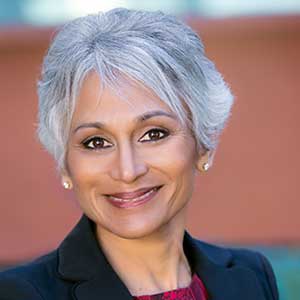Global Engagement Colleague Spotlight
November, 2023

Chandra Ramamoorthy
An expert in global health before many others, we are excited to learn from our esteemed colleague and Professor of Anesthesiology, Perioperative and Pain Medicine, Dr. Chandra Ramamoorthy. Dr. Ramamoorthy has a rich history of addressing inequities in healthcare access and quality care.
What is your current title and capacity within our Department?
Professor, Anesthesiology
What are your academic and/or research interests?
Pediatric anesthesia, Pediatric cardiac anesthesia.
Where did you grow up?
India
How do you think your upbringing influenced your world view? (culture, religion, geography, economics, other factors)?
I saw economy disparities affect health care access and delivery and children were the lowest in the totem pole for care. I started out as a pediatrician and worked in primary care. Convincing parents to immunize their children and reduce child birth by access to safe birth control were some of the major clinics I participated in. When in Medical School in India I found some of the overseas visitors out of touch with local reality. Talking about expensive diagnostic tests to cover all bases was such a waste of time-both of the speaker and the audience.
How is healthcare different in other countries where you have lived/visited/worked?
I have worked in China, India and Malaysia. In all these locations access to care is affected by economics, geographical location -rural versus urban, gender-in china most of the children brought in for surgery were boys.
How do you think we can improve the care of our patients in the USA?
Access to preventive care for all. This reduces the disease burden and cost of care.
How does a global perspective strengthen the care of patients?
Disease prevention and early access to care should be a global goal. Air travel has made the rapid spread of disease a reality . As physicians we need to understand diseases from all over the world and respond expeditiously. Having delivered care in both developed and developing countries, I firmly believe that good care does not have to be expensive or exclusive.
How have your unique insights and experiences along your journey informed your work and career?
Awareness of all the things we in Stanford have access to. We should be able to help without being condescending. Often the local health care teams are very talented. It is not a lack of knowledge but a lack of access to material and supplies that will allow them to use their knowledge. I therefore shy away from trips where “education” is the main focus. I have always wondered about providing the material for the education and reducing my carbon footprint. Zoom has made many things possible, and conducting learning seminars and posttest assessments would be very valuable. This could be followed by a practicum where a senior physician from developed country then makes the trip to the resource poor area. I also learnt that they have manpower which makes up for lack of material. On one occasion a patient was exsanguinating. Having access to 2-3 OR orderlies who were able to use manual pumps to transfuse blood saved the day. Adaptability is important. We must examine why we have set safety standards and might have to adjust them for the location without sacrificing patient safety.
What has been your most challenging or surprising lesson learned when engaging with other cultures?
Engage local health care providers. They are a valuable resource and I have learnt much from them.
What has been the most amazing thing you have seen while traveling to another country?
The appreciation demonstrated by the patients and health care providers for traveling thousands of miles to provide care. Time is the most important thing one can give.
